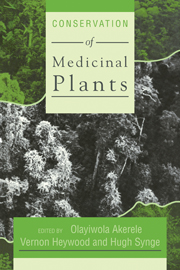Book contents
- Frontmatter
- Contents
- Contributors
- Preface
- Acknowledgements
- The Chiang Mai Declaration
- Introduction
- The Issue of Medicinal Plants
- Science, Industry and Medicinal Plants
- Techniques to Conserve Medicinal Plants
- Policies to Conserve Medicinal Plants
- Experiences from Programmes to Conserve Medicinal Plants
- 21 Medicinal Plants in India: Approaches to Exploitation and Conservation
- 22 The Chinese Approach to Medicinal Plants – Their Utilization and Conservation
- 23 Conservation of Medicinal Plants in Kenya
- 24 Complexity and Conservation of Medicinal Plants: Anthropological Cases from Peru and Indonesia
- 25 Utilization of Indigenous Medicinal Plants and their Conservation in Bangladesh
- 26 Development of a Conservation Policy on Commercially Exploited Medicinal Plants: A Case Study from Southern Africa
21 - Medicinal Plants in India: Approaches to Exploitation and Conservation
Published online by Cambridge University Press: 07 September 2010
- Frontmatter
- Contents
- Contributors
- Preface
- Acknowledgements
- The Chiang Mai Declaration
- Introduction
- The Issue of Medicinal Plants
- Science, Industry and Medicinal Plants
- Techniques to Conserve Medicinal Plants
- Policies to Conserve Medicinal Plants
- Experiences from Programmes to Conserve Medicinal Plants
- 21 Medicinal Plants in India: Approaches to Exploitation and Conservation
- 22 The Chinese Approach to Medicinal Plants – Their Utilization and Conservation
- 23 Conservation of Medicinal Plants in Kenya
- 24 Complexity and Conservation of Medicinal Plants: Anthropological Cases from Peru and Indonesia
- 25 Utilization of Indigenous Medicinal Plants and their Conservation in Bangladesh
- 26 Development of a Conservation Policy on Commercially Exploited Medicinal Plants: A Case Study from Southern Africa
Summary
In India, medicinal plants are widely used by al) sections of the population, whether directly as folk remedies or the medicaments of the different indigenous systems of medicine, or indirectly in the pharmaceutical preparation of modern medicine. The country is richly endowed with a wide variety of plants of medicinal value which represent a great national resource.
Traditionally, practitioners of the Indian systems of medicine – Ayurveda, Unani, Siddha – made up their own prescriptions for their patients but, nowadays, most of their remedies are manufactured products. The increasing demands of the pharmaceutical industry have created problems of supply and one of the major difficulties being experienced by the Indian systems of medicine is that of obtaining sufficient quantities of medicinal plants for the manufacture of genuine remedies. In the absence of standards for crude drugs, adulteration and substitution have become common.
To correct this situation, measures are needed to promote the cultivation of medicinal plants, to improve methods of collection, to ensure effective quality control and to regulate commerce so as to protect both the producer and the consumer.
There is also a need to create greater general awareness amongst the population as a whole, government officials (particularly those in agriculture and forestry), farmers and scientists of the medicinal and economic value of these plants, so that this heritage may be wisely used and exploited, and at the same time conserved for future generations.
With this in mind, the Ministry of Health and Family Welfare sponsored four regional seminars on medicinal plants in 1986. These were held at Gunagadh (western region), Manali (northern region), Gauhati (northeastern region) and at Coimbatore (southern region).
- Type
- Chapter
- Information
- Conservation of Medicinal Plants , pp. 295 - 304Publisher: Cambridge University PressPrint publication year: 1991
- 1
- Cited by



